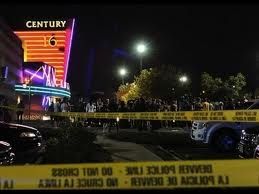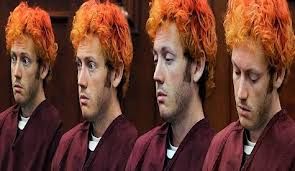
"Did you see the movie?" accused mass murderer James Holmes asked a worker at the Arapahoe County Jail in Centennial, Colo., the Tuesday after the Friday night massacre, according to the 

"Did you see the movie?" accused mass murderer James Holmes asked a worker at the Arapahoe County Jail in Centennial, Colo., the Tuesday after the Friday night massacre, according to the
James Holmes. Is he really that insane? That tone deaf? Or deluded but knowing the differences between right and wrong enough to stand trial? We shall see. He planned it all. Then he paid to see The Dark Knight Rises. Went in. Sat down. Watched the first half-hour, got "sidetracked" and then, well, you know the rest: 12 killed, 58 wounded.
America is stunned again by a mass murder. By his senseless killings. “His.” Men, men, men. Always men.. (As I write this, a man was just arrested with dozens of weapons, who says he's the Joker. Still another man was reportedly just arrested in Pennsylvania for killing three people and kidnapping his 4-year old daughter.)
Houston, we’ve got a problem
But these murders are never truly senseless, are they? Gunmen, mad or angry, have reasons, reasons that victims often knoweth not. So, a shocked, dazed and confused nation asks why, as if knowing why will salve its collective anxiety. Give closure. As if knowing why will prevent these cancer incarnates from reinfecting the body of our increasingly complex, stress-fomenting culture. Likely not.
Incalculable memories were scarred by Holmes’ mid-night rootin tootin, horrifying event, wrenched by the trauma: those in the Century 16 theater in Aurora, and their friends, relatives and neighbors.
But wait, there’s more. There's the collateral damage to those in the global, media-saturated cosmos: To those of us who inhaled the horror, saw the damage on myriad screen platforms, who heard the eyewitness tales rising from the bottomless crypt of broadcast nightmares.
Even from our audience-safe remove, we didn't actually escape slaughter-trauma. We empathized, sympathized, even identified as we have so many times before. The visual screeds of atrocity and horror, domestic and foreign, seem omnipresent. They leave claw marks on our psyches.
There is a bright side -- we can still be traumatized. But I fear for our culture when our curiousity about the latest mass murder is deadened from their epidemic repetition, and we turn the channel from "breaking news" bulletins to find something more entertaining. At least we're not there yet. No mass murder ennui. Not yet.
******
The word trauma covers a multitude of wounds. A friend of mine, a cinematherapist, sent an email about how he has been scarred, changed, embittered by the massacre erupting at the Century 16 midnight opening of The Dark Knight Rises. He wrote:

The word trauma covers a multitude of wounds. A friend of mine, a cinematherapist, sent an email about how he has been scarred, changed, embittered by the massacre erupting at the Century 16 midnight opening of The Dark Knight Rises. He wrote:
"My personal problem with Mr. Holmes is this: I grew up with those superheroes, those characters who appeared in the comics and on the silver screen... Superman, Batman, Spiderman, Wonder Woman, Captain America were but a few... My interest in the comic book heroes, however, has not consisted simply of a childhood excitement. I continued to read and watch those superheroes and their villains while they were "developing" into the legends of our present time ... Over the years every superhero reminded me of the exciting and fascinating memories I had for decades with my family, friends and co-worker, until... the tragedy we experienced a couple of days ago.
Not only did Mr. Holmes kill 12 innocent people and hurt many others but he murdered something very personal: those beautiful superheroes-heroines locked into my psyche, tying me to those memories I have always treasured! Batman supervillains like Cesar Romero, Jack Nicholson, Heath Ledger were my family members.... until this "you-know-who, or what" who claimed to be THE Joker, stole the imagery! Now, each comic character in general and Batman-Joker duo in particular will be associating me to this terrible carnage, for years to come...this is the personal problem I have with Mr. Holmes...unlike some victim family members who already started forgiving him, I will not... Allow me to stop here with a Spaghetti Western -- my favorite genre -- title: "Chiedi Perdono a Dio... Non a Me” – “May God Forgive You... But I Won't.”
I wrote back, "Touching, excellent point. Innocence is too precious a thing to lose or to have violently ripped from your eternal child’s memory. It is truly unforgivable."
Obviously the loss of lives and loved ones is of a greater order of emotional magnitude than the closing of mind corners for escapist fantasies. The experience of a comfortably fitting innocence whenever he sat down to imbibe in and lose himself in superhero adventures is over for my friend. It is his Pavlovian nightmare.
That psychological fact, like it or not, may stay with my colleague longer than sympathetic recollections of the lives lost at the movie. That Proustian reverie of days gone by were snatched away by Mr. Holmes because they are now tied irrevocably to the Batman saga. and may even generalize to my friend's other superheroes. It is his time of loss.
My friend's angry cry from the heart raises the broader issue about the fragile, safe space between the parallel universes of reality and fantasy. How does one freely suspend disbelief and enjoy superheroes battling supervillains when a real life villain on his murderous rampage obliterates that space?
Research shows that the closer fictionalized murder and violence come to reality, as in documentary chronicles or televised live news events, the less most humans enjoy it. The less free we are to suspend disbelief, the less we can play with our fantasies, discharge pent-up stress or undo the unfair, hurtful, embarrassing experiences in our personal lives.
So, the present can taint the past, can poison the well of remembrances. For my dear friend it has. And for how many others?



